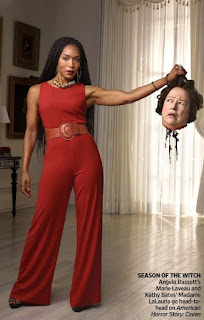In AHS Coven, Kathy Bates plays a resurrected slave-owning racist (like the ones we have on this plain at this time aren't enough!) and Angela Bassett's Marie Leveux gets revenge!
A few years ago, a talented musician--the one-man band Earwig Spectre--had a hit called "What Does W Stand For?" The possible answers, in the song, were "wealth, waste, war," but ultimately the fascist (now beacon of liberal hope by comparison) George W. Bush.
(For a view on times our community got it right, please see my subsequent post.)
Two more widely-used words starting with w are witch and wiccan. For some, these paths include "white magik," which sometimes includes liberal application of white light and white salt. As I mentioned in a previous post, this isn't my path, but it is a respected and valid one. The question is, do all these "w" words mean this path is only for white people?
Last night, I attended an event for a witch I have long admired. I am leaving her name and the group name out of this post, because this is not about one personality--in fact, she could little have controlled the venue and audience. The event was in a gentrified, largely white (58 percent in 2015) area of a city (a major city that isn't as major as it thinks it is).
Upon parking, I saw a woman in a black, floral-print skirt and jacket that was colorful and heavily beaded. She was looking around a bit lost, so I asked if she was okay. We had a shared concern about parking and whether there was a meter to pay and identified the entrance to the event.
Upstairs, I asked the woman about a second foray she had made to be sure about the parking issue. (This was worth doing, since this is in a city where they will tow your car for no reason whatsoever, unless you are black--in which case they shoot you and then send your estate tickets for the car.) Not having known me for 10 minutes, the woman quickly shared that the parking was okay, but she had been really worried for her safety. In fact, she has passed "slums" on her way to the venue and thought she might not be safe to park and walk to the venue. I tried to redirect her by rather gently suggesting that this was actually an area that was problematic because of gentrification and that there was nothing to fear from the surrounding, predominantly African-American neighborhoods in this hypersegregated city (whether a place is still a "city" when its residents embrace such parochial--and vile--practices as segregation is another question). The woman persisted, despite my cues, in making inappropriate comments about black people and the neighborhoods around the event, so I ended the conversation, stating that perhaps she should fear the bankers who live in her suburban oasis (which, based on census data, contains about 23 total black people).
The event itself was white. Out of about 50 people, one woman identified herself (saying she supported diversity in her comments) as indigenous American. The group is holding a festival this weekend in an area that is 67 percent white (.07 percent indigenous). Of course, they cite cost concerns, but one has to wonder if all urban neighborhoods were included in the cost analysis, or just the "safe" ones.
In contrast, I recently attended Conjure Fest in Detroit. There, I was not only in (near) a diverse city, but among a group with black people in the leadership and a consciousness of celebrating diversity. The incomparable organizer pointed to diversity as a reason for the festival--creating a culture of celebrating, not just tolerating. The efforts at inclusion were successful, blogged up beautifully here (the post that convince me to make the trip to the Fest).
White people--witch, wiccan, pagan and other--have a huge, unfulfilled obligation to stop engaging in--and tolerating--assumptions that majority-minority neighborhoods are unsafe and other racists tropes. These comments are entirely out of place in a system built on diversity and respect. As a group, we can make a big step forward by actively seeking to hold events in diverse venues. On an individual level, expressing the truth that all kinds of communities--including predominantly African-American ones--are safe, welcoming, and fulfilling places to be challenges the ethos of protecting whiteness with layer upon layer of whiteness, with white women's perception of safety being paramount (even unto the lynching of blacks who--allegedly--whistle at them). Otherwise, we might as well just bring the kindling and burn ourselves, howling our righteous whiteness as we burn.


